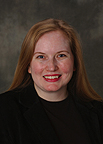March 15, 2006
Irish Studies helps students reconnect with roots
CARBONDALE, Ill. -- If anyone knows about the union between the English and Irish, it's Jane Elizabeth "Betsy" Dougherty.
Raised in Long Island, N.Y., Dougherty is the product of such a union: an Irish Catholic father and English Protestant mother.
"Not every scholar is influenced by their family or where they grew up, but in my case it did," said Dougherty, assistant professor of English specializing in Irish studies at Southern Illinois University Carbondale. "Growing up in New York and seeing people from so many different cultures living together had an effect."
As a member of SIUC's nationally acclaimed Irish Studies program, Dougherty is taking her interest in her Irish-English roots to a new level as she pursues rare, 200-year-old political "pamphlets" written by Irish politicians who were at that time wrestling with the idea of disbanding their own legislature and forming a union with Great Britain. The pamphlets allowed politicians to communicate their reasoning both to their colleagues and the public.
The union gained approval in 1801. Politicians both for and against referred to the union as a "marriage" to England. Dougherty hopes to trace how that metaphor worked its way from political writings into the Irish literature she adores, and what effect it had there.
"Politicians on both sides used the marriage argument," Dougherty said. "But marriage was a very ambiguous thing then. Those who were pro-union talked about the good aspects of marriage. And those who were against it used the bad things about it."
The 100 or so political pamphlets Dougherty is consulting are scattered around the world. About 40 pages each in length, she reviewed several of the documents at the National Library in Ireland and others at the University of Notre Dame. Another 30 or so are at the Newberry Library in Chicago, and Dougherty plans to review them soon. Dougherty believes she may have discovered several previously unknown pamphlets, as well.
Dougherty theorizes that the marriage metaphor so prevalent in the political discourse of the time affected Irish writers in several ways. Many literary works of the time used marriage in their plots, so she's confident she'll be able to trace its impact, which may have been unintentional on the part of the authors.
"I'm looking for where it begins to appear in literature and how it changes the narrative texts," Dougherty said. "It's a big theory in our field, that what authors intend to write and what actually happens is sometimes different."
Dougherty's research will add to the voluminous record in the field compiled at SIUC by Charles Fanning, who heads the SIUC Irish Studies program. Fanning, who is on sabbatical until fall, has helped make SIUC Irish Studies one of the leading such programs in the country and is regularly tapped by scholars and media for his expertise. In 2004, Fanning received the University's top academic honor when he was named SIUC's Outstanding Scholar.
Dougherty's research reflects a growing general interest in all things Irish. Dougherty relates to that growing curiosity and longing by Irish-Americans to understand more about their roots.
"My last name is Dougherty, so it has to start right there," she said.
Her father, like millions of others in the United States, embraced his lineage as the rise of multiculturalism made it more socially acceptable to do so. Dougherty grew up in a house filled with Irish music and tales of her family's background and culture.
Her father's growing interest in his own Irish roots and her mother's English ones led Dougherty down a scholarly path that last year deposited her at SIUC, where the Irish Studies program is growing in popularity.
"People love Ireland. I mean, 40 million Americans claim Irish decent," Dougherty said with a laugh. "Some of it is St. Patrick's Day, but that's really a very American invention. It's really a religious day.
"The students we get, I think, are looking for that connection," Dougherty said. "Irish-Americans don't always feel that connection to their home country as many of the more recent immigrants do. For a lot of students, the program is a way of reconnecting.
"It's a lot easier and a lot safer to do so now," she said. "It's more permitted. We really celebrate cultural differences much more now."
There's no doubt the Irish have had a large impact on American culture, and vice-versa. And it's difficult to tell, in some cases, where the line between Irish assimilation into American culture ends and Irish influence upon that culture begins. Several American expressions, for instance, owe their origins to Irish words.
"The term ‘so long' comes from the Irish word ‘slån,' which means ‘goodbye,'" Dougherty said. Also, the term "galore" comes from the Irish term "go leor," meaning a large number or selection.
Dougherty is helping further strengthen the prominent program by pursuing a grant to bring an Irish language teacher on board at SIUC next year. The Irish language is very different from English, and is one of two official languages of the country, Dougherty said. Irish is mainly spoken in small, remote villages called Gaeltachts.
Developing citizen-leaders with global perspectives, and leading in scholarly, research and creative activities are among the goals of Southern at 150: Building Excellence Through Commitment, the blueprint the University is following as it approaches its 150th anniversary in 2019.

Jane Elizabeth Dougherty
Download Photo Here
